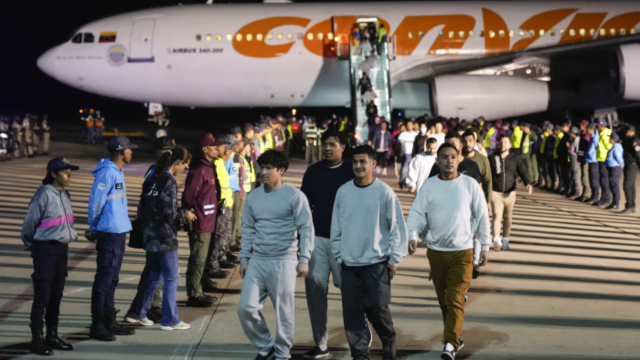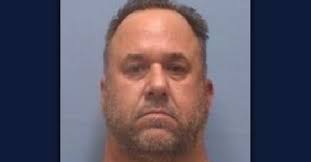President Donald Trump delivers a speech at a reception for Greek Independence Day in the White House East Room, Monday, March 24, 2025, in Washington (AP Photo/Jacquelyn Martin).
The Trump administration continues to maintain it didn’t violate a federal court directive by declining to turn back dozens of flights containing over 200 Venezuelan migrants to El Salvador, all of which were collectively deported without hearing en masse under an 18th century wartime authority.
The Justice Department on Tuesday informed Chief U.S. District Judge James E. Boasberg that his March 15 injunction barring the government from summarily “removing” migrants under the Alien Enemies Act of 1798 was not necessary because planes already outside U.S. airspace were not being asked to return, as the “removal” of the migrants was already a completed act by the time the order was made.
[T]he injunction therefore prohibits the Government from completing removals; it does not enjoin the Government to reverse removals already completed,” the DOJ asserted in the 14-page filing (emphasis in original). “Here, any members of the putative class on the cited flights had already departed the United States when the minute order was entered, and therefore already had been removed.”. No court can order the President to produce them, and there is no reasonable basis to interpret the Court’s minute order as mandating that unprecedented action.
The filing follows one day after the Trump administration invoked the state secrets privilege to deny Boasberg any further information regarding the deportation flights, asserting that to do so would harm foreign relations and national security.
At the March 15 emergency hearing, DOJ attorneys informed Boasberg of two planes they indicated had already departed from Texas bound for a infamous jail in El Salvador. Boasberg around 6:45 p.m. issued an oral order instructing the government to have any planes flying those being removed under the Alien Enemies Act turn back.
According to the transcript of the hearing, Boasberg said:
[O]n the fact that you will notify your clients of this right away, and that any aircraft carrying these individuals that is about to take off or already in flight must be brought back to the United States, but those individuals must be brought back to the United States. However that’s done, whether to turn a plane around or not putting anyone on the plane or those individuals who are covered under this on the plane, I leave up to you. But this is something that you need to ensure is adhered to immediately.
But under the Trump administration, the oral order of the judge was overridden by his 7:25 p.m. written order, which only barred removals under the war powers authority and did not contain the explicit directive for the planes to be returned. In any case, the filing claims that since the flights departed from an airport close to the “outer edge of U.S. airspace” roughly two hours prior to Boasberg’s order, the migrants on board had already been lawfully “removed” from the nation.
Accordingly, by the time the Court entered its injunction, the occupants of the planes had already been “transferred” — i.e., taken away — from United States territory and airspace. The Government therefore did not “remove” any class members from the United States after the entry of its injunction. In fact, the Government could not have “removed” them from a location they had already left.
In other words, the Government did not issue any removal flights to head back to the United States. But as explained above, choosing not to transport class members back to the United States is not equatable with removing them from the United States. Since the injunction did not mention anything regarding class members who had already left the country, there was no breach.
The government also argues that even assuming Boasberg’s order was meant to order the return of the deportation flights, the court does not have the power to issue such a directive due to the president’s “ample independent authority” to “decline to bring foreign terrorists into the United States.
“The President’s final ordering of the flights in question here — particularly once they had left U.S. airspace — involved military affairs, national security, and foreign affairs beyond our Nation’s borders,” Tuesday’s filing continues. “Therefore, it was outside the courts’ power to decide.”
Boasberg has promised to “get to the bottom” of whether his order was breached and who authorized such, threatening “consequences.
A three-judge appellate court panel heard oral arguments Monday afternoon on the DOJ’s motion to have Boasberg’s order vacated. At the hearing, one judge stated Nazis being held in U.S. custody during World War II “got better treatment” than the Venezuelan migrants, another suggested he felt the case had been wrongly brought in Washington, not Texas, and the third asked no questions.
The case is probably going to center on whether or not the U.S. owes migrants who were detained pursuant to the Alien Enemies Act an opportunity to challenge if the act may be applied against them.
Trump and his followers have called for the impeachment of Boasberg, which came with a stern rebuke by Chief Justice John Roberts, reminding the president that “impeachment is not an appropriate response to disagreement concerning a judicial decision.”
Significantly, Boasberg has also been tasked with overseeing a suit alleging the Trump administration broke federal law by debating war plans on the Signal app after it was revealed that senior national security officials inadvertently added a reporter to their Signal group chat planning an imminent Yemen attack.


 by
by 




